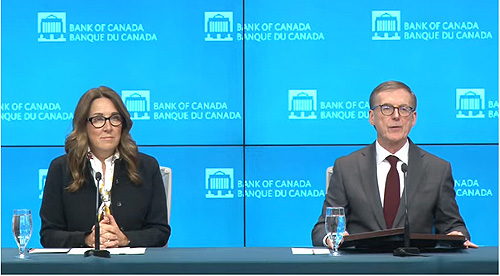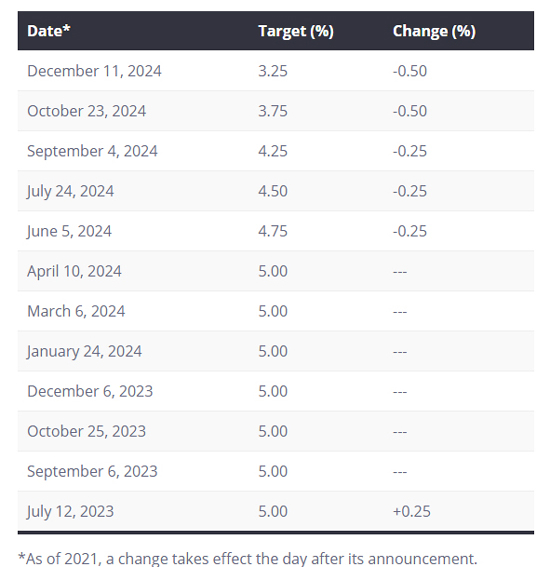
Monday January 6, 2025 | VICTORIA, BC [As first published January 4, 2025]
Economic analysis by Mary P Brooke | Island Social Trends
Canada’s economy is in a state of uncertainty. While a certain path is never really known, there are many factors that tend to make everyone pause and think about their options.
- Will there indeed be tariffs imposed on Canadian exports to the tune of 25% soon after the new US president is sworn in on January 20?
- Will Canadians be able to keep up with the grinding burden of the ever-increasing cost of everything — particularly groceries and housing/renting — while somehow managing to pay down high levels of debt?
- Will governments be able to continue much longer with affordability supports?
- Will cutbacks of programs and employees be necessary in 2025?
- Will the 2025 federal election lead to a change in how the government manages the economy?
- How low will the value of the Canadian dollar go in 2025 compared to the US dollar?

All of these things, and more, will be impacted by the next Bank of Canada interest rate decision which is scheduled for Wednesday January 29. In that context, this is probably the Bank’s most important decision of 2025. No pressure!
Anything more than a .25% drop on January 29 means the Bank of Canada will have deviated from it’s stated intention of “a more gradual approach” in 2025 as stated by Bank of Canada Governor Tiff Macklem on December 11.
Macklem also said last month that Bank of Canada decisions will be taken one meeting at a time after the previous two steps on September 4 and October 23 which he called “bigger than normal”.

Rates dropped in 2024:
The Bank of Canada interest rate remained at 5% from July 12, 2023 to June 5, 2024 but then was dropped five times in 2024, landing at 3.25% by year-end:
- On June 5 the rate was lowered by 25 basis points from 5% to 4.75%.
- Then on July 24 the rate was dropped a further 25 basis points to 4.5%.
- On September 4 the rate was dropped another 25 basis points to 4.25%.
- On October 23 the rate was dropped 50 basis points to 3.75%.
- On December 11 the rate was dropped by 50 basis points to 3.25%.

Inflation now in target range:
When the December 11 interest rate drop was announced, the rate of inflation was 2.0% (October 2024 stats). That’s within the Bank of Canada’s target range of 1 to 3%.

Since then, total CPI inflation is down a bit to 1.9% (November 2024 stats).

Possible trends for 2025:
As the Bank of Canada and various economists have pointed out, economic conditions are relatively stagnant and productivity continues to fall short of what the economy needs. Under these conditions the Bank’s inclination would be to drop interest rates further in January, and possibly also March.
If even a 25 basis points drop were to happen on January 29 and then again on March 12, that would still only bring the interest rate to 2.75%.

The greatest uncertainty is what the United States might possibly impose in the way of tariffs later this month.
If a 25% tariff is indeed imposed against all Canadian imports into the United States, then the Bank of Canada might very well justify a drop of at least 50 basis points on January. That would bring Canada’s interest rate down to 2.75% before the end of this month.

People also need to take into consideration that the Canadian dollar is hovering at low levels compared to the US dollar. As at January 3, 2025 the Canadian dollar was worth about 69 cents US.
Who benefits by lower rates:
Generally speaking, it is only those who hold mortgages and small business loans and lines of credit at variable rates who will benefit in the short term from any lowering of the central bank’s interest rate.
It is difficult in current economic conditions for businesses to reduce their prices. Even with a drop in interest rates, it’s seen by businesses as more of an opportunity for some modest expense relief as opposed to passing on savings to their customers.
Credit card companies almost never drop their interest rates in any immediate way, if at all, in response to central bank rate cuts. They are still interested in maximum gain from their customers. This is what economists call ‘sticky’ interest rates; once the credit card companies raise their rates they rarely bring them back down, at least not until they’ve had the opportunity to get even more revenue from interest payments by their cardholders.
Household debt is now the highest it’s ever been in Canada. This is not about frivolous overspending but in most cases about people relying on credit cards to pay for necessities like groceries, family expenses and topping up to pay the rent.

High inflation impacts are embedded:
The impact of high inflation from the post-pandemic period is now fully baked into the cost of nearly everything.
As stated several times by Island Social Trends in recent months — the lowering of the Bank of Canada interest rate has been too slow and too little to really help average Canadians and small businesses.
- People have had to make significant and often long-term adjustments to their lives and lifestyles including paying higher rents or shifting their household situation.
- In order to make ends meet many households and small businesses have taken on even more debt, and/or make smaller less frequent payments on their credit obligations.
- The cost of nearly everything has gone up, including the basics of life like groceries, housing, transportation and insurance.
The spillover effect of those new burdens is seen across society including the impacts on health and well-being of individuals, households and communities.
BC Premier David Eby has blamed the central bank’s poor management of interest rates several times as in having made the cost of housing construction too costly, in addition to the overall cost of living for households.
The federal government’s GST tax holiday for two months (December 14, 2024 to February 15, 2025) will bring a modest short-term consumer benefit; that was more of a political gimmick that will help mostly those who already have financial fluidity. Struggling households will see little to no real benefit.
Rate announcement dates in 2025:
The Bank of Canada 2025 schedule for policy interest rate announcements includes eight announcement dates through the year.
- Wednesday, January 29
- Wednesday, March 12
- Wednesday, April 16
- Wednesday, June 4
- Wednesday, July 30
- Wednesday, September 17
- Wednesday, October 29
- Wednesday, December 10
Rates are announced at 9:45 am Eastern Time (6:45 am Pacific). Rates come into effect the day after the announcement.
The Monetary Policy Report will be published concurrently with the January, April, July and October rate announcements.

===== RELATED:
- Premier Eby says Bank of Canada interest rate decisions have hurt the BC economy (December 12, 2024)
- Bank of Canada drops interest rate to 3.25% (December 11, 2024)
- Bank of Canada – webcast of December 11, 2024 rate announcement (December 11, 2024)
- Last interest rate announcement of 2024 coming up December 11 (December 4, 2024)
- Canada’s Premiers discuss border & tariffs with Trudeau (November 27, 2024)
- GST winter tax holiday misses political mark, frustrates businesses, and fails many families (November 23, 2024)
- Bank of Canada half-point interest rate drop (October 23, 2024)
- Bank of Canada lowers interest rate to 4.25% (September 4, 2024)
- Bank of Canada drops interest rate for 2nd time in 2024 (July 24, 2024)
- Eby continues to target Bank of Canada about interest rates (July 17, 2024)
- First Bank of Canada rate drop in four years (June 5, 2024)
- NEWS SECTIONS: BUSINESS & ECONOMY | POLITICS | CANADIAN FEDERAL ELECTION 2025 | CANADA-USA





